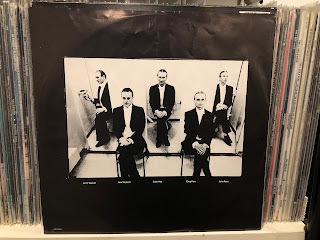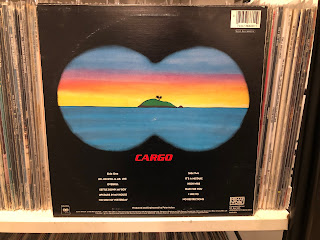Back in 1981 seemingly out of nowhere Men at Work were suddenly everywhere. A pair of honest to goodness earworms in "Who Can it Be Now?" and "Down Under" propelled the band into the stratosphere. I eagerly bought the album, and remember being profoundly disappointed in the record. Two killers, and filler. It's not an album I've heard in decades.
In 1983 the band dropped Cargo and again the band scored big with a couple of tracks: "Overkill" a song that has aged incredibly well, and "It's a Mistake" that was very much part of the early '80s hysteria over nuclear annihilation. Fearing that it was going to be another killer and filler I didn't pick up the album, and sure enough I dismissed the album, and there it sat on my shelf until I lost my records.
Fast forward, and Colin Hay the principal creative behind the band, managed to ride the success of those first two Men at Work albums, and become an elder statesmen. There's no doubting his talent, and his distinctive voice hide a deceptively impressive vocal range. No to mention he's a heck of a player.
I was poking around the dollar bin at the my favourite record store, and Adrian had done a fair bit of weeding and restrocking and it was a banner day. Among the treasures were those first two Men at Work album, with Business as Usual having the white cover (I had the yellow back in the day) and a really clean looking copy of Cargo. I added them to the other dozen records and went to pay. I must have dropped one as when I got home I only had Cargo. Not a problem, this is the one I wanted. I figured it was time to sit and revisit an album I'd not heard for decades.
The opening track "Dr. Jeckyl & Mr. Jive" wasn't the best start, and it reminded me of a piece I'd read about who actually sequenced the songs on a record. The article I read stated quite unequivocally that it was the mastering engineers who placed the songs in order of their sonic requirements, placing some at the beginning, and others farther in where there was less vinyl to reproduce the sound. I suppose there's a grain of truth there but mostly call bullshit as artists tend to nitpick over details like song order and placement.Although it would sort of explain why the band led off with a dud. The two killer songs are still the two standout tracks, but I will revise my earlier assessment of the rest being filler. While I'll never be as invested in music as I was in my youth, my appreciation is probably greater now, just with less object permanence. The biggest surprise was the closing track "No Restrictions" a song I'd forgotten about, that features some great guitar work by Ron Strykert. As soon as it started I remembered how much I had liked this one. It was just different enough to stand out.
While Colin Hay wrote the majority of the material on the album and sang most of the songs, a couple of tracks were written and sung by guitarist Ron Strykert. Those songs were more new wave and really showcased his style of playing which was pretty distinctive.
It was fun going back and revisiting, and while it softened my long held opinion of the album, it also served as a reminder that when the band was good they were spectacular.
The band was:
- Colin Hay - vocals / guitar
- Ron Strykert - guitar / vocals
- Jerry Speiser - drums / vocals
- Greg Ham - sax / flute / keyboards / vocals
- John Rees - bass / vocals



Comments
Post a Comment